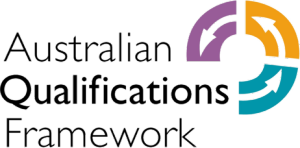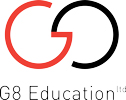
A community college is a type of undergraduate higher education institution, generally leading to an associate degree, certificate, or diploma. The term can have different meanings in different countries: many community colleges have an "open enrollment" for students who have graduated from high school. The term usually refers to a higher educational institution that provides workforce education and college transfer academic programs. Some institutions maintain athletic teams and dormitories similar to their university counterparts.
Technical and further education or simply TAFE is the common name in English-speaking countries in Oceania for vocational education, as a subset of tertiary education. TAFE institutions provide a wide range of predominantly vocational courses.
Education in Australia encompasses the sectors of early childhood education (preschool) and primary education, followed by secondary education, and finally tertiary education, which includes higher education and vocational education. Regulation and funding of education is primarily the responsibility of the States and territories; however, the Australian Government also plays a funding role.
Endeavour Foundation is a not-for-profit charity headquartered in Brisbane, Queensland, Australia. It is one of the largest disability service providers in Australia, employing over 1800 staff and supported by 1200 volunteers.
Workers' Educational Associations (WEA) are not-for-profit bodies that deliver further education to adults in the UK, Australia, New Zealand, and Canada.

The Australian Qualifications Framework (AQF) specifies the standards for educational qualifications in Australia. It is administered nationally by the Australian Government's Department of Industry, with oversight from the States and Territories, through the Standing Council of Tertiary Education Skills and Employment. While the AQF specifies the standards, education and training organisations are authorised by accrediting authorities to issue a qualification.
A registered training organisation (RTO), in Australia, is an organisation providing Vocational Education and Training (VET) courses to students, resulting in qualifications or statements of attainment that are recognised and accepted by industry and other educational institutions throughout Australia.
Performing arts education in Australia refers to the teaching of different styles of creative activity that are performed publicly. The performing arts in Australia encompasses many disciplines including music, dance, theatre, musical theatre, circus arts and more. Performing arts education in Australia occurs both formally and informally at all levels of education, including in schools, tertiary institutions and other specialist institutions. There is also a growing body of evidence, from the Australian Council for the Arts and the Parliament of Australia, showing that First Nation's participation in the arts and culture has significant economic, social and cultural benefits to Australia and further supports the outcomes of the Australian governments ‘Closing the Gap’ campaign. There has been an increasing number of scholarships opening up in educational institutions for Indigenous Australians aimed at encouraging this participation in the arts.

Tertiary education in Australia is formal education beyond high school in Australia, consisting of both government and private institutions and divided into two sectors; Higher Education and Vocational Education and Training (VET) provided by government-owned TAFEs & private Registered Training Organisations (RTO). Australian Qualifications Framework (AQF), the Australian national education policy, classifies tertiary qualification into 10 levels: level 1 to 4 vocational certificates ; level 5 & 6 undergraduate diploma and advanced diploma; level 6 associate degree; level 7 bachelor degree, level 8 bachelor honours degree & graduate certificates and graduate diplomas; level 9 for master's degree; and level 10 PhD. Most universities are government owned and mostly self-regulated. For other institutes there are two national regulators for tertiary education for registration, recognition and quality assurance of both the "provider institutes" as well as the "individual courses" provided by the providers. Tertiary Education Quality and Standards Agency (TEQSA) regulates institutes which provide education from level 5 or above. Australian Skills Quality Authority (ASQA) regulates institutes which provide education from level 1 to level 6.

Education in Victoria, Australia is supervised by the Department of Education and Training (DET), which is part of the State Government and whose role is to "provide policy and planning advice for the delivery of education". It acts as advisor to two state ministers, that for Education and for Children and Early Childhood Development.
Teaching in Victoria, Australia is regulated by the Victorian Institute of Teaching, through the Department of Education and Training (DET), which is part of the State Government. The DEECD is biggest operator of schools in the state, and along with the independent and Catholic school systems have an interest in teaching as the operator of schools and employer of teachers.
The Malaysian Qualifications Framework or the MQF is a unified system of post secondary qualifications offered on a national basis in Malaysia. It is administered by the Malaysian Qualifications Agency (MQA), a statutory body under the purview of the Ministry of Higher Education (MOHE).

The Manchester College is the largest further education college in the United Kingdom and the largest single provider of 16-19, adult and higher education in Greater Manchester, with more than 25% of Greater Manchester’s learning provision undertaken by the college.
In England, learning and skills refers typically to post-compulsory education and training, provided by further education and sixth form colleges, schools with sixth forms, local authority and adult education institutions, private and voluntary sector providers, offender learning, and workplace learning including Apprenticeships and other employer-facing initiatives. The learning and skills sector is vital to increasing productivity, economic competitiveness and sustainable employment in the UK

Knowledge and Human Development Authority(KHDA) (Arabic: هيئة المعرفة والتنمية البشرية) is the educational quality assurance and regulatory authority of the Government of Dubai, United Arab Emirates which is responsible for evaluation and accreditation of higher educational institutions and universities in the Emirate of Dubai. Established in 2006 by the country's Vice President and Prime Minister Sheikh Mohammed bin Rashid al-Maktoum, it is the main body that oversees the growth of private education sector in the emirate, including early childhood education centers and schools.
Youth Off The Streets is an Australian non-denominational not-for-profit youth organisation. The organisation works with young people and their families and communities in an endeavour to create safety, offer support and provide opportunities to build a positive future.
Launch Housing is a secular Melbourne-based community organisation that delivers homelessness services and housing supports to disadvantaged Victorians.
Phoenix P–12 Community College is a school located in the Ballarat suburb of Sebastopol, Victoria, Australia. It formed in 2011 with the amalgamation of Sebastopol College and Redan Primary School. The school was named after the Phoenix mine, located south of the school.
The Erdiston Teachers' Training College is located in Pine Hill, Bridgetown, Barbados. It is affiliated with the School of Education of the University of the West Indies, Cave Hill Campus.

G8 Education is Australia’s largest ASX-listed early childhood and care (ECEC) provider. Its 430+ childcare centres are marketed under 21 brands such as Kindy Patch Kids, Jellybeans, Kinder Haven, First Grammar, Community Kids, Pelicans Learning for Life and Casa Bambini. G8 Education’s head office is located in Gold Coast., Australia. Across Australia, G8 Education cares for around 50,000 children every week and employs almost 10,000 employees.







